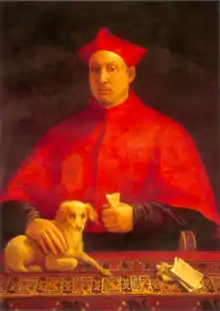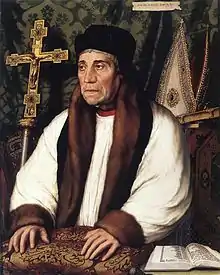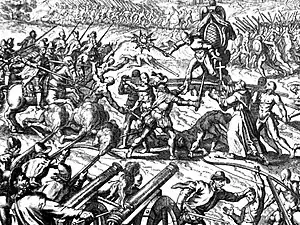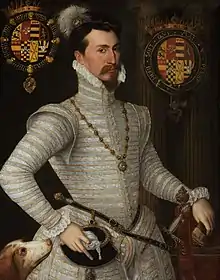1532
Year 1532 (MDXXXII) was a leap year starting on Monday (link will display the full calendar) of the Julian calendar.
| Millennium: | 2nd millennium |
|---|---|
| Centuries: | |
| Decades: | |
| Years: |
| 1532 by topic |
|---|
| Arts and science |
| Leaders |
|
| Birth and death categories |
| Births – Deaths |
| Establishments and disestablishments categories |
| Establishments – Disestablishments |
| Works category |
|
| Gregorian calendar | 1532 MDXXXII |
| Ab urbe condita | 2285 |
| Armenian calendar | 981 ԹՎ ՋՁԱ |
| Assyrian calendar | 6282 |
| Balinese saka calendar | 1453–1454 |
| Bengali calendar | 939 |
| Berber calendar | 2482 |
| English Regnal year | 23 Hen. 8 – 24 Hen. 8 |
| Buddhist calendar | 2076 |
| Burmese calendar | 894 |
| Byzantine calendar | 7040–7041 |
| Chinese calendar | 辛卯年 (Metal Rabbit) 4228 or 4168 — to — 壬辰年 (Water Dragon) 4229 or 4169 |
| Coptic calendar | 1248–1249 |
| Discordian calendar | 2698 |
| Ethiopian calendar | 1524–1525 |
| Hebrew calendar | 5292–5293 |
| Hindu calendars | |
| - Vikram Samvat | 1588–1589 |
| - Shaka Samvat | 1453–1454 |
| - Kali Yuga | 4632–4633 |
| Holocene calendar | 11532 |
| Igbo calendar | 532–533 |
| Iranian calendar | 910–911 |
| Islamic calendar | 938–939 |
| Japanese calendar | Kyōroku 5 / Tenbun 1 (天文元年) |
| Javanese calendar | 1450–1451 |
| Julian calendar | 1532 MDXXXII |
| Korean calendar | 3865 |
| Minguo calendar | 380 before ROC 民前380年 |
| Nanakshahi calendar | 64 |
| Thai solar calendar | 2074–2075 |
| Tibetan calendar | 阴金兔年 (female Iron-Rabbit) 1658 or 1277 or 505 — to — 阳水龙年 (male Water-Dragon) 1659 or 1278 or 506 |
| Wikimedia Commons has media related to 1532. |
Events
January–June
- January 22 – São Vicente is established as the first permanent Portuguese settlement in Brazil.[1]
- March 18 – The English Parliament bans payment by the English Church to Rome.
- April – Battle of Quipaipan in Peru: Atahualpa wins the civil war in the Inca Empire, defeating his brother Huáscar.
- May 13 – Francisco Pizarro lands on the northern coast of Peru.
- May 16 – Sir Thomas More resigns as Lord Chancellor of England.
- June 25 – Suleiman the Magnificent leads another invasion of Hungary.
July–December
- July 23 – The Nuremberg Religious Peace is granted to members of the Schmalkaldic League, granting them religious liberty.[2]
- August 13 – Union of Brittany and France: The Duchy of Brittany is absorbed into the Kingdom of France.
- August 5–30 – Siege of Güns: The Ottoman army under Sultan Suleiman the Magnificent fails to take the city of Güns, and due to the incoming raining weather and reinforcements from Charles V to Vienna, Suleiman's army retreats.
- September 1 – Lady Anne Boleyn is created Marquess of Pembroke by her fiancé, King Henry VIII of England.
- November 16 – Francisco Pizarro and his men capture Inca emperor Atahualpa at Cajamarca, ambushing and slaughtering a large number of his followers, without loss to themselves. He subsequently offers a ransom of approximately $100 million in gold.
Date unknown
- The Prince is published five years after the death of the author, Niccolò Machiavelli.
- Pantagruel is published by François Rabelais.
- Henry VIII of England grants the Thorne brothers a Royal Charter to found Bristol Grammar School.
- Stamford School is founded in England by William Radcliffe.
- The Paris Parlement has the city's beggars arrested "to force them to work in the sewers, chained together in pairs".[3]
- A possible date for the battle of the Maule between Incas and Mapuches, according to historian Osvaldo Silva.[4]
Births
- January 21[5] – Ludwig Helmbold, German classical singer (d. 1598)
- February 14 – Richard Lowther, English soldier and official (d. 1607)
- February 19 – Jean-Antoine de Baïf, French poet and member of the Pléiade (d. 1589)[6]
- March 20 – Juan de Ribera, Spanish Catholic archbishop (d. 1611)
- March 25 – Pietro Pontio, Italian music theorist and composer (d. 1596)
- April 13 – Frederick of Denmark, Prince-bishop (d. 1556)
- April 21 – Martin Schalling the Younger, German theologian (d. 1608)
- April 23 – Anna Marie of Brunswick-Lüneburg, Duchess of Prussia (d. 1568)
- April 24 – Thomas Lucy, English politician (d. 1600)
- June 6 – Giulio Antonio Santorio, Italian Catholic cardinal (d. 1602)
- June 7 – Amy Robsart, wife of Robert Dudley, 1st Earl of Leicester (d. 1560)
- June 13 – Countess Palatine Helena of Simmern, countess consort of Hanau-Münzenberg (1551-1561) (d. 1579)
- June 16 – Francis Coster, Brabantian Jesuit theologian, author (d. 1619)
- June 24
- Robert Dudley, 1st Earl of Leicester, English politician (probable;[7] d. 1588)
- William IV, Landgrave of Hesse-Kassel, German Protestant leader (d. 1592)
- July 1 – Marino Grimani, Doge of Venice (d. 1605)
- July 12 – Mechthild of Bavaria, German duchess (d. 1565)
- July 25 – Alphonsus Rodriguez, Spanish Jesuit lay brother and saint (d. 1617)
- August 14 – Archduchess Magdalena of Austria, Member of the House of Habsburg (d. 1590)
- October 4 – Francisco de Toledo, Spanish Catholic cardinal (d. 1596)
- October 30 – Yuri of Uglich, Prince of Uglich (d. 1563)
- November 16 – Clara of Brunswick-Wolfenbüttel, Abbess of Gandersheim, later Duchess of Brunswick-Grubenhagen (d. 1595)
- November 22 – Anne of Denmark, Electress of Saxony (d. 1585)
- November 28 – Bartholomäus Ringwaldt, German poet and theologian (d. 1599)
- December 7 – Louis I, Count of Sayn-Wittgenstein (d. 1605)
- December 20
- John Günther I, Count of Schwarzburg-Sondershausen (d. 1586)
- Orazio Samacchini, Italian painter (d. 1577)
- December 26 – Guilielmus Xylander, German classical scholar (d. 1576)
- date unknown
- Robert Abercromby, Scottish Jesuit missionary (d. 1613)
- William Allen, English cardinal (d. 1594)
- Hernando Franco, Spanish composer (d. 1585)[8]
- Luís Fróis, Portuguese missionary (d. 1597)
- Pedro Sarmiento de Gamboa, Spanish explorer (d. 1592)
- John Hawkins, English navigator (d. 1595)
- Étienne Jodelle, French dramatist and poet (d. 1573)
- Ralph Lane, English explorer (d. 1603)
- Henry Percy, 8th Earl of Northumberland (d. 1585)
- Thomas Norton, English lawyer (d. 1584)
- Tulsidas, medieval Hindi poet and philosopher (d. 1623)
- Flavio Orsini, Italian Catholic cardinal (d. 1581)
- probable
- Sofonisba Anguissola, Italian portrait painter (d. 1625)
- Archibald Campbell, 5th Earl of Argyll, Scottish politician (d. 1575)
- Orlande de Lassus, Flemish composer (d. 1594)
Deaths

Cardinal Pompeo Colonna

Reverend William Warham
- May – Elizabeth Stafford, Countess of Sussex
- June – Bernardino Luini, Italian painter (b. 1482)
- June 28 – Pompeo Colonna, Italian Roman Catholic cardinal (b. 1479)
- August 11 – John of Denmark, Danish prince (b. 1518)
- August 16 – John, Elector of Saxony (b. 1468)[9]
- August 19 – Caritas Pirckheimer, German nun (b. 1467)
- August 22 – William Warham, Archbishop of Canterbury (b. 1450)
- September – Vlad VI Înecatul, Prince of Wallachia
- October 1 – Jan Mabuse, Flemish painter
- December 2 – Louis Gonzaga (Rodomonte), Italian-French dignitary and diplomat (b. 1500)
- December 3 – Louis II, Count Palatine of Zweibrücken, Duke of Zweibrücken from 1514 to 1532 (b. 1502)
- December 11 – Pietro Accolti, Italian Catholic cardinal (b. 1455)
- December 13 – Solomon Molcho, Portuguese mystic (b. 1500)
- December 30 – Krzysztof Szydłowiecki, Polish noble (b. 1467)
- date unknown
- Andrea Riccio, Italian sculptor and architect (b. 1470)
- Jeanne de la Font, French poet and culture patron (b. 1500)
- Huáscar, 12th Inca Emperor
References
- Rachel Lawrence: 2010, Page 183
- article on the Nuremberg Religious Peace, page 351 of the 1899 Lutheran Cyclopedia
- Foucault, Michel (January 30, 2013). Madness and Civilization: A History of Insanity in the Age of Reason. Knopf Doubleday Publishing Group. p. 47. ISBN 9780307833105. Retrieved March 2, 2015.
- Silva Galdames, Osvaldo (1983). "¿Detuvo la batalla del Maule la expansión inca hacia el sur de Chile?". Cuadernos de Historia (in Spanish). 3: 7–25. Retrieved January 10, 2019.
- Probable:John Flood (September 8, 2011). Poets Laureate in the Holy Roman Empire: A Bio-bibliographical Handbook. Walter de Gruyter. p. 828. ISBN 978-3-11-091274-6.
- Oscar Thompson; Nicolas Slonimsky (1956). The International Cyclopedia of Music and Musicians. Dodd, Mead. p. 2381.
- Sir Richard Beale Colvin (1934). The lieutenants and keepers of the rolls of the county of Essex. printed by Whitehead Morris ltd. p. 46.
- Suzanne Spicer Tiemstra (1992). The Choral Music of Latin America: A Guide to Compositions and Research. Greenwood Publishing Group. p. 4. ISBN 978-0-313-28208-9.
- "John | elector of Saxony". Encyclopedia Britannica. Retrieved October 20, 2020.
This article is issued from Wikipedia. The text is licensed under Creative Commons - Attribution - Sharealike. Additional terms may apply for the media files.

